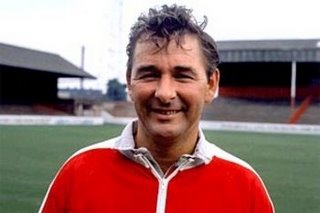
When I was a kid of four or five, my father and my sister sat me down to make a momentous, life-changing decision. I was now big enough to choose a football team to support. A colourful A5 booklet was thrust into my tiny hands: the Littlewoods Pools guide to the coming season. Each double page spread gave the prospects of every team in the old first division for the next year, a team photograph and a picture of their badge.
Would I support the team my father supported, Wolverhampton Wanderers, a team settling into a long mediocrity, but stilled buoyed somewhat by their past greatness? Or like my sister, support Liverpool; then the greatest team in Europe, full of household names? Nope. I fell in love with that ultra-stylized team badge of Nottingham Forest, an image that magically alluded abstractly to the Robin Hood mythology I so loved at the time. Even the name"Nottingham Forest" suggested Sherwood Forest, men in Lincoln Green swinging gaily from tree to tree, rather than dour Midlands industrialisation. Kids, eh?
My family scoffed. This was a team who'd just won promotion back to the top flight after years, decades, of under achieving. Yet this team, from nowhere, then proceeded to win the championship that season, and win the European Cup for the next two in a row. Not only that, but they were the team of Martin O'Neill, the Northern Ireland captain who led the 1982 World Cup side to such unexpected glory. But most especially, they were the team of Brian Clough, who managed to be the funniest, most charming, most contrary personality football has seen during my lifetime. Maybe not a tactical genius (that was what Peter Taylor was for, surely?), just the best man-manager the sport had ever seen, the most charismatic motivator of athletes possible.
Exasperating, flawed, controversial, sure. But lovable. And that's why I was fighting back tears on Monday for the death of a man I've never met.